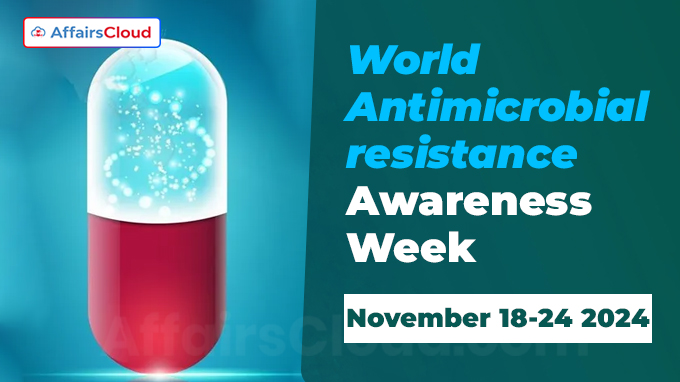 World AMR (Antimicrobial Resistance) Awareness Week (WAAW), previously known as “World Antimicrobial Awareness Week (WAAW), is annually observed across the globe from 18th to 24th November to create awareness and understanding of AMR.
World AMR (Antimicrobial Resistance) Awareness Week (WAAW), previously known as “World Antimicrobial Awareness Week (WAAW), is annually observed across the globe from 18th to 24th November to create awareness and understanding of AMR.
- WAAW is an annual global campaign led by World Health Organisation (WHO).
- The campaign aims to promote the best practices among the one health stakeholders to reduce the spread and emergence of drug resistant infection.
Theme:
The theme for the WAAW 2024 is “Educate. Advocate. Act now.”
- The 2024 theme calls on the global community to educate stakeholders on AMR, advocate for bold commitments and take concrete actions in response to AMR.
Background:
i.The 68th World Health Assembly (WHA), held in 2015, supported the global action plan to address the growing problem of antibiotic and other antimicrobial resistance.
- The first ever WAAW was observed from 16th to 22nd November 2015.
ii.In May 2020, Tripartite Organisations – the Food and Agriculture Organisation of the United Nations (FAO), the World Organisation for Animal Health (OIE) and WHO expanded the scope of WAAW changing its focus from “antibiotics” to the more encompassing and inclusive term “antimicrobials”.
iii.The Tripartite Executive Committee has also decided to fix WAAW dates to 18th to 24th November starting from 2020.
- WAAW has been observed as “World Antimicrobial Awareness Week” since 2020.
About Antimicrobial Resistance (AMR):
i.Antimicrobial resistance (AMR) is a global public health problem that occurs when microorganisms like bacteria, fungi, viruses, and parasites become resistant to antimicrobial medicines.
ii.The main reason for the development of drug-resistant pathogens are the misuse and overuse of antimicrobials in humans, animals and plants.
- According to WHO, bacterial AMR was directly responsible for 1.27 million global deaths in 2019 and contributed to 4.95 million deaths.
Events 2024:
The Kingdom of Saudi Arabia hosted the 4th Global High-Level Ministerial Conference on Antimicrobial Resistance. This facilitated the implementation of the commitments outlined in the political declaration approved at the 2024 United Nations General Assembly (UNGA) High-Level Meeting (HLM) on AMR.
- Union Ministry of State (MoS) Anupriya Singh Patel, Ministry of Health and Family Welfare (MoH&FW) addressed 4th High-Level Ministerial Conference on AMR in Jeddah, Kingdom of Saudi Arabia.
- The theme of the conference was ‘From Declaration to Implementation – Accelerating Actions Through Multisectoral Partnerships for the Containment of AMR’.
Key Points:
i.During the conference, India proposed a comprehensive approach to improve AMR detection and surveillance capacities across sectors. This enables the use of data to guide evidence-based antimicrobial usage at both local and national levels.
ii.This will lay the foundation for the creation of integrated and interoperable surveillance systems across sectors.
iii.The proposal includes prioritizing sustainable financing and research investments to enhance governance in the fight against AMR.
iv.The conference also witness the issuance of the ‘Jedda Commitments’ which resolved to translate the Political Declaration from the UNGA HLM on AMR into practical commitments for urgent action inter alia committing to create national AMR multi-sectoral coordinating bodies respecting the multipronged One-Health challenges.
WHO’s Report highlights the Role of Vaccines in Prevention of AMR
WHO launched the report title “Estimating the impact of vaccines in reducing antimicrobial resistance and antibiotic use” during the webinar hosted and moderated by the WHO. The report discussed the implications and strategies to integrate vaccines into AMR containment plans.
- The report was brought together experts from organisations like Bill & Melinda Gates Foundation, Combating Antibiotic-Resistant Bacteria Biopharmaceutical Accelerator (CARB-X), The International Federation of Pharmaceutical Manufacturers and Associations (IFPMA), Gavi, the Vaccine Alliance and National Institute of Health.
Highlights of the Report:
i.The report offers a detailed, systematic evaluation on the role of vaccines in reducing the AMR by examining their role in mitigating AMR health burden, curbing antibiotic use and alleviating associated economic burden.
ii.The report focus on 24 pathogens and 44 vaccines. This includes licensed vaccines, vaccines in late clinical development and vaccines in early development, and quantifies their potential in reducing AMR.
iii.The report also finds that vaccines, developed and used optimally could avert up to 2.5 billion of defined daily doses (DDDs) of antibiotics annually, this is equivalent of 22% of the global estimated antibiotic use in humans associated with treating the evaluated pathogens in the report.
- The existing vaccines, vaccines in late clinical development and vaccines in early development could avert up to 142 million, 1.9 billion and 548 million DDDs annually respectively.
- The highest impact would be seen in the WHO South-East Asia Region (40% of global averted burden) with 1 billion DDDs potentially averted.




